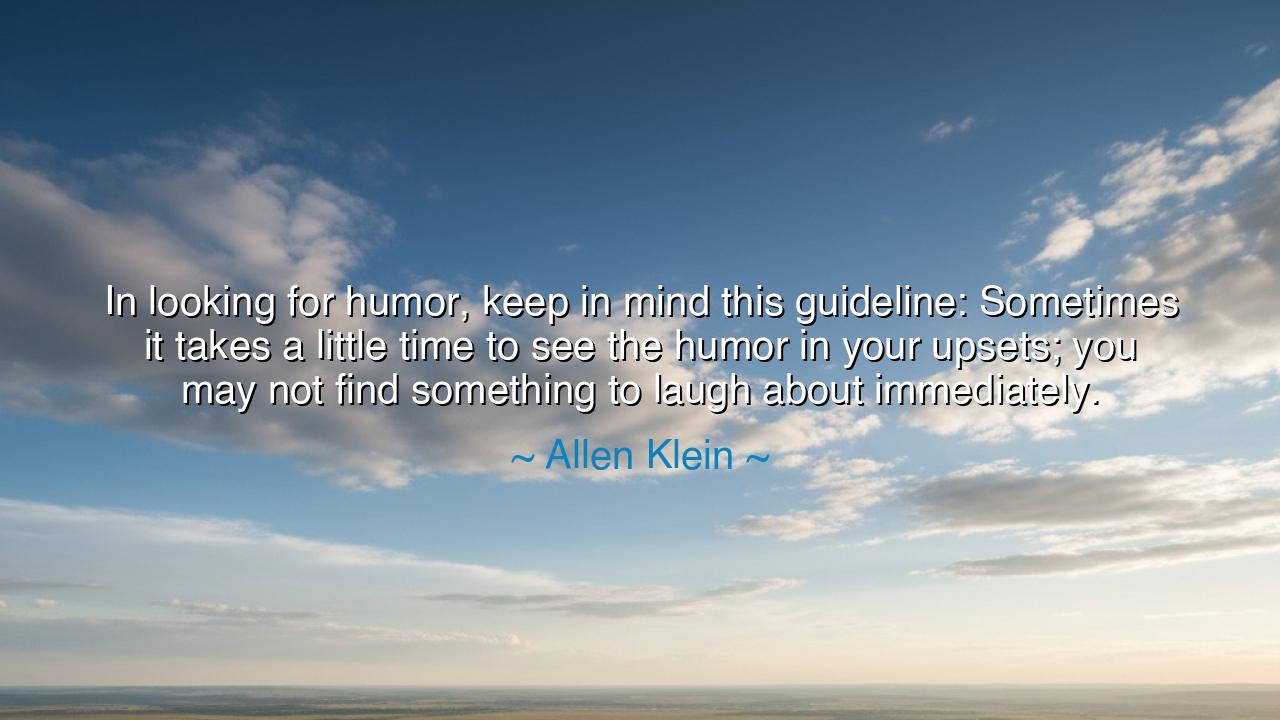
In looking for humor, keep in mind this guideline: Sometimes it
In looking for humor, keep in mind this guideline: Sometimes it takes a little time to see the humor in your upsets; you may not find something to laugh about immediately.






In the gentle yet profound words of Allen Klein, master of light in dark times, we find a teaching as steady as dawn breaking after a storm: “In looking for humor, keep in mind this guideline: Sometimes it takes a little time to see the humor in your upsets; you may not find something to laugh about immediately.” Within these words lies not a mere suggestion, but a sacred truth — that healing takes time, and laughter, though powerful, is a fruit that must ripen in its own season. For there are moments in life when pain blinds the heart, when sorrow seems to silence joy; yet, if one endures with patience, even the bitterest grief may one day yield a quiet, golden humor that softens what once seemed unbearable.
The origin of this wisdom comes from Klein’s lifelong study of humor as a medicine of the spirit. A survivor of personal tragedy, he learned through his own journey that laughter is not denial, but transformation — a bridge from suffering to peace. His words remind us that though laughter is divine, it does not come on command. It is not the mockery of pain, but the alchemy that turns pain into understanding. Just as night gives way slowly to morning, so too does the soul learn, over time, to smile again at what once made it weep.
The ancients knew this mystery well. In the plays of Euripides, the heroes who endure loss often find, in the end, a moment of release — not through triumph, but through perspective. The Greek tragedians taught that laughter and tears are siblings born from the same mother: awareness. Both arise when the soul confronts the truth of life’s impermanence. Allen Klein stands in that lineage, teaching that the heart’s wounds must first be felt before they can be forgiven, and that forgiveness itself is the soil in which humor grows. To laugh at what once caused pain is to declare: “You no longer have power over me.”
Consider, for instance, the story of Abraham Lincoln, who, during the darkest days of the American Civil War, was known for his profound humor. Many mistook his jokes for frivolity, but those close to him understood the truth: his humor was not escape, but endurance. In his grief — for he lost both comrades and his own child — he learned to smile not because life was easy, but because he refused to let despair rule him. Yet even Lincoln did not laugh instantly at sorrow. He bore it first, carried it in silence, and only later, when time had softened its sting, did he allow humor to transmute his pain into wisdom. This is the very essence of Klein’s teaching.
When Klein says, “you may not find something to laugh about immediately,” he invites us to practice patience with our healing. The soul, like the body, cannot be forced to mend before its time. To demand laughter too soon is to deny the dignity of sorrow. But when we wait — when we let the heart breathe and the tears fall — then humor comes naturally, gently, like sunlight through clouds. It does not erase the pain but redeems it, reminding us that even tragedy can be woven into the larger tapestry of meaning.
This teaching carries within it a quiet power: it tells us that laughter is not the opposite of grief, but its evolution. To find humor in our suffering is not to mock it, but to rise above it. The wise know that every wound, when seen from a distance, reveals its lesson; every hardship, when viewed through the eyes of time, becomes a story we can smile at — not because it was painless, but because we survived it. The laughter that follows suffering is sacred; it is the laughter of resurrection.
So, my child of the future, take this lesson to heart: when pain comes, do not rush to laugh, but also do not close the door to laughter forever. Let yourself feel, let yourself grieve, and trust that in time, humor will return like spring after winter. When it does, welcome it as a friend — for it will bring peace where once there was only hurt. Remember Allen Klein’s wisdom: that laughter, when born from patience and perspective, is not merely joy — it is freedom. Therefore, walk through your sorrow slowly, with faith in the passage of time, and one day you will look back upon your trials and smile — not because they were easy, but because you endured, and through endurance, you became whole.






AAdministratorAdministrator
Welcome, honored guests. Please leave a comment, we will respond soon